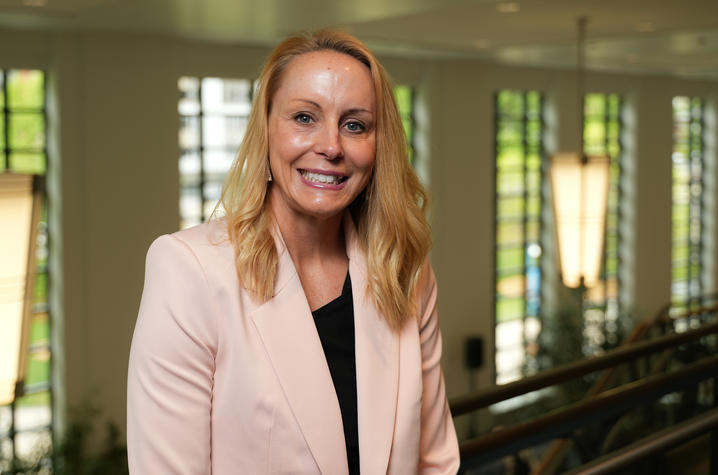CDC grant targets Kentucky’s tobacco-related health disparities

A new Centers for Disease Control and Prevention (CDC) grant targeting tobacco-related health disparities has been awarded for a program designed by Melinda Ickes, Ph.D., a University of Kentucky College of Education professor of health promotion.
UK is among eight sites across the U.S. using the funding to address health disparities related to using menthol and other flavored tobacco products. It is part of a CDC Office on Smoking and Health five-year, $15 million program focused on advancing health equity and advances the mission of the White House Cancer Moonshot.
“There is a disproportionate burden of tobacco use on racial and ethnic minorities in the U.S. Our effort is to support advocacy and policy that will reduce flavored tobacco use, specifically menthol tobacco use, and focus on marginalized communities and those who are targeted by the tobacco industry,” Ickes said.
Ickes is acting assistant dean for research in the UK College of Education, a professor in the Department of Kinesiology and Health Promotion, and directs the PREVENT Lab. She is affiliated with UK College of Nursing, where she serves as co-director of the Tobacco Policy Research Program and is a member of the BREATHE (Bridging Research Efforts and Advocacy Toward Healthy Environments) research team.
Recipients of the CDC funding will engage diverse partners to promote and support social, economic and community change to increase awareness of the harms of menthol and other flavored tobacco product use, as well as promote the availability of cessation services. They will educate the public, community leaders, partners and decision-makers on policy, systems and environmental changes that can prevent and reduce menthol tobacco use, as well as create culturally appropriate interventions tailored for community needs. The team will also use research, surveillance and evaluation to measure progress in reducing tobacco-related health disparities and inform public health action.
Ickes’ initiative, known as “EMPOWER,” is titled “Empowering and Mobilizing Intergenerational Community Partners to Reduce Menthol and Flavored Tobacco Use Among At-risk Communities in Kentucky.”
UK researchers, including Ickes and her BREATHE colleagues, have worked with community partners and tobacco-related coalitions in Kentucky through years of health advocacy efforts. Through studies and community outreach, they are continuing to gather insights and data to support prevention, treatment and ultimately reduce the burden of tobacco use in Kentucky. The new CDC grant will engage and empower diverse communities to help make decisions on health-related programs and initiatives that are tailored to reach those most targeted to use flavored tobacco products.
“Our partners and coalitions are already doing important work in Kentucky communities,” Ickes said. “They are really the ones who know what is going on and have direct interaction with community members and will help us get the community voices we need to hear from.”
An intergenerational team of individuals known as “community health champions” will be recruited to steer the direction of the new EMPOWER initiative and ultimately work toward sustainable changes to support health equity. The UK research team will work with two community coalitions, serving two different counties in Kentucky, to conduct a health equity and community needs assessment during year one of the grant, to support the development of tailored community action plans. They will conduct evidence-based prevention and advocacy training with each of the coalitions and community health champion teams during all five years of the grant.
“We will be listening and responding to what we are hearing. We want to know what these communities want to prioritize. We need to hear their perspective to really understand the barriers and opportunities. This will help us develop culturally relevant strategies that will resonate across different groups,” Ickes said.
Among the most at risk are young people, with data showing they have higher rates of initiating tobacco use and higher risk of dependence, Ickes said.
“Our young people continue to be targeted by the tobacco industry when we look at marketing, price discounts and access and availability of these tobacco products. However, there are adults and aging adults who use these tobacco products, too, so we know an intergenerational approach is critical,” Ickes said.
Beyond reducing tobacco use, Ickes envisions the partnerships with community health champions being an impetus behind the cultivation of a level of awareness and advocacy in communities that will lead to improved health outcomes more broadly.
“My vision is to empower,” Ickes said. “While this grant talks about menthol and tobacco products, we are also equipping the champions with skills they can use across a variety of community health issues. I hope it will reduce tobacco use, but also mobilize communities to want to make positive health changes.”
This project is supported by the Centers for Disease Control and Prevention (CDC) of the U.S. Department of Health and Human Services (HHS) as part of an award totaling $375,000 with 0% financed with nongovernmental sources. The contents are those of the author(s) and do not necessarily represent the official views of, nor an endorsement, by CDC, HHS, or the U.S. Government. For more information, please visit CDC.gov.
Credits
Amanda Nelson (College of Education)
Photo: Jeremy Blackburn (Research Communications)

